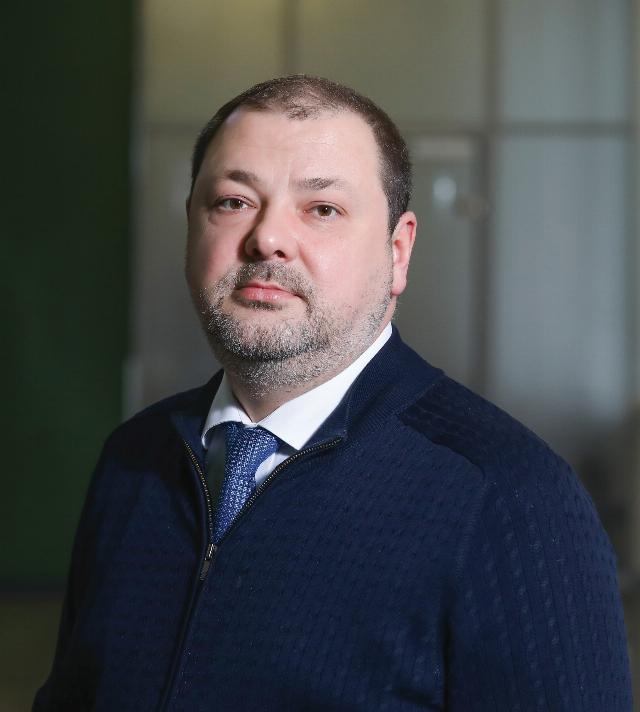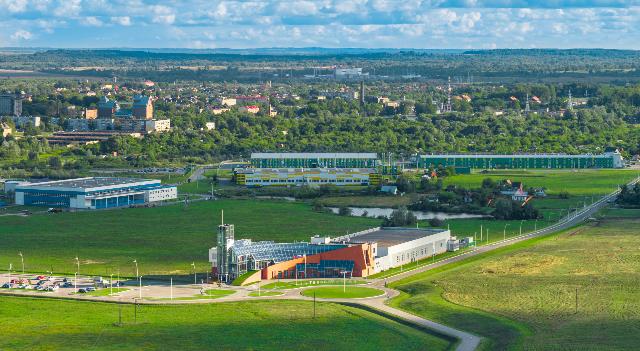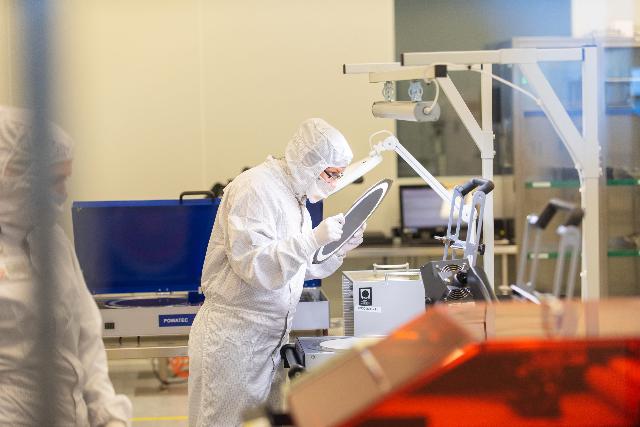Interview with Fyodor Boyarkov, Vice President of GS Group in the yearbook "Live Electronics of Russia 2025"
Russian electronics manufacturers have coped with the sanctions pressure, but they may lose out in the fight against counterfeiting," admits Fedor Boyarkov, Vice President for Production Development at GS Group. In an interview with Zhivoy Electronics, a top manager of the country's largest contract electronics manufacturer said that only one minute was enough for the factory to produce a smartphone, and assured that the next three years would be crucial for the industry. What powers does the regulator lack to eradicate the evil that kills domestic production, and what list does the Ministry of Industry and Trade need to make so that prices for Russian products become close to prices for Chinese products? Read about townhouses for employees, the introduction of a ban on parallel imports, and why any technological operation localized in Russia should automatically become mandatory in our interview.

Fyodor Valentinovich, judging by the news feed on the website, GS Group is doing well. Have all the conditions for the development of electronic production been created in the country?
The industry is really developing, and the government contributes to this in many ways. But there are still many tasks, and it is too early to talk about the imminent onset of full technological sovereignty.
What problems are hindering development?
There are two main problems, and one follows from the other. This is a counterfeit and there are no checks in which these violations can be identified. The problems have been relevant since we embarked on technological sovereignty. They have worsened with the imposition of sanctions. At the end of last year, the Russian government extended the ban on purchases of many types of foreign goods to state corporations, municipal institutions and companies with state participation. This is positive news for domestic manufacturers – there should be more electronics in the register of Russian industrial products. The trouble is, there are no violations of the law either. Unscrupulous participants claim to have Russian components in their products, which are actually used only in a small "demonstration" batch, and foreign electronic components are already used in the bulk of products. And it is almost impossible to verify this. The Ministry of Industry and Trade as an industry regulator does not have such powers. In fact, at present, bloggers are mainly engaged in checking what is in the registry and is actually being sold.
Do you have any suggestions on how to fix this?
–Labeling should be the main way to combat counterfeit products. The experiment on it was successfully launched, and we supported it from the very first days. Conscientious manufacturers in the industry regarded this as a very positive step that will definitely increase the transparency of the market. In the future, it is necessary to organize a traceability system based on GIS, so that at any stage it is possible to track the entire production chain: from ECB to finished products. For example, the tax service has implemented such a system. By analogy, the same accounting documents can confirm the origin of the device's components. Finally, we need regulatory authorities authorized to check domestic electronics for compliance after they are included in the registry. Take and disassemble several devices from an already implemented batch, see if there really is what is claimed inside.
You mentioned a GIS-based traceability system. In the era of sanctions, is it dangerous to "shine" such data?
Yes, it's not safe to open this system completely now. But it can have access levels. It is enough to make a note that the manufacturer has in stock the amount of equipment that allows you to produce a particular device. And the whole "background", that is, the names of the companies that supplied the ECB, should probably only be seen by the regulator – the same Ministry of Industry and Trade. Of course, you can't do that at the moment. It is necessary that control be tightened so that the manufacturer's responsibility for counterfeiting appears. For example, a blacklist and exclusion from the register of domestic products. When such a system starts functioning, and production volumes at Russian factories grow, in two years we will see a real decrease in prices. And if the cost of imported and domestic goods becomes the same, it is unlikely that anyone will continue to engage in counterfeiting. This activity will lose its meaning. I also believe that any operation that is localized on the territory of the Russian Federation should automatically become mandatory in the 719th decree of the Government of the Russian Federation. It would seem that this is the first thing to start with. But many technological changes that have long been mastered in the country are still not such.
For example, which ones?
Currently, enclosure is not fixed as a mandatory operation for level 2 integrated circuits in the 719th PP, although this operation is successfully performed not only by our GS Nanotech plant, but also by other Russian enterprises. – The media reported that the production capacity of tablets and smartphones in Russia is loaded by only 20%, and the volume of demand is 100 thousand devices per year. Will the implementation of the proposals you have voiced help to load these capacities? – I have seen these data and I beg to disagree with them. Companies that produce smartphones also produce other devices. For example, servers, automated workstations, switches, etc. Therefore, it cannot be argued that the tablet and smartphone production facilities are idle. Another thing is that we do have a reserve of capacity, and we are able to produce more.
Among other things, the introduction of restrictions on parallel imports of electronics could stimulate demand. Let me remind you that this mechanism allows you to import electronics into the country to persons who are not official dealers of products. Accordingly, if a country has sufficient production volumes of similar goods, they should be excluded from parallel imports in order to stimulate the national market. – What measures of support for microelectronics manufacturers, in your opinion, are really effective? – First of all, these are sales guaranteed by the 719th PP, as well as subsidies. When the government participates in financing a project, it is good not only in terms of financial support at the start. This is a guarantee that the state will continue to support the project, that is, it will provide a sales market. And, of course, the measures to combat counterfeiting, which I have already described.
How is intra-industry cooperation developing? What helps to form sustainable production chains?
Our market is self-regulating, which means that the process proceeds naturally. The industry is small, everyone knows something about each other. Therefore, as soon as any questions arise, people come to you through a single handshake.
When the industry is small, is it easier for players to negotiate?
In some ways, yes, in some ways not. But if the market were wider, we would not have any questions about the expediency of creating new production facilities and building factories. There is a huge market in China, but at the same time, the manufacturers' capacities are 100% loaded. The more factories there are, the better. And we go, evaluate the demand and discuss whether we need this enterprise in the territory of the Russian Federation. This was once the case with our GS Nanotech plant, which was ahead of its time.

What do you mean?
Since its opening (and this is, for a moment, 2011), microcircuits with a topology of 28 nm can be packaged at the facilities of the enterprise, although the production of crystals (chips) of this level has not been mastered in the country. When this happens, we will be ready for mass production. But this case is rather an exception to the rule: they usually invest in technologies for which demand has already been formed. GS Nanotech is currently a state–of-the-art production facility designed for the serial packaging of such complex chips as controllers and processors. We can, are able, and have an equipped production facility for manufacturing batches of hundreds of thousands and even millions of complex microcircuits with a usable product yield close to 100%.

And how technologically advanced are the other plants of the holding?
We regularly modernize enterprises. So, the renovation of our CTS contract site was recently completed, for which we spent about 182 million rubles. Now, without exaggeration, it is equipped with the latest science and technology. For example, artificial intelligence is responsible for some operations. The upgrade allowed us to launch large server boards and significantly speed up the build speed. For example, we assemble a smartphone in just a minute, and we can easily assemble 600 laptops in a day. Our cardboard packaging company, the First Cardboard Factory, is also in the process of modernization. The production of domestic GS LED LEDs is located at the facilities of GS Nanotech. At the end of 2024, our technologies and competencies allowed us to produce the country's first Russian LEDs with ultra-warm light and sulfur protection. There are also successes at Prankor, an enterprise that manufactures tooling and products made of plastic and metal. I would like to note that the success of GS Group largely depends not only on the capacity and adaptability of each of the enterprises, but also on their synergy: the Technopolis GS innovation cluster implements a cycle of production of electronic devices (from chip packaging to assembly and packaging of finished products).
Does market coherence help to defend the interests of the industry, or are associations only needed to share experiences?
The exchange of experience is also important, but still, the main area of activity of industry associations is the preparation of proposals to improve legislation in the interests of the state and the players. GS Group's associations and consortia have managed to gain credibility with relevant agencies, and their expertise is valued, including through pluralism of opinions. For example, changes to the 719th PP are coordinated with each industry community. Since GOST standards and standards are constantly changing, it is necessary to ensure operational interaction between the industry and the state, when companies act in a consolidated manner and react quickly to changing conditions. Associations interact with authorities on a one-stop-shop basis, which significantly increases the efficiency and speed of decision-making, while allowing manufacturers to take into account their opinions. I would like to note that the government, as represented by the Ministry of Industry and Trade and, in particular, the DREP, actively promotes the formation of cooperation and industry interaction in radio electronics, contributing to the creation of favorable conditions for development by developing an appropriate regulatory framework and providing support measures.

What are your main efforts focused on?
I believe that we have coped with the sanctions pressure by replacing the components that were unavailable to us with analogues. But in order to gain the desired technological sovereignty, it is necessary to deepen localization. At the moment, together with our partners, we are starting the implementation of a project for the production of printed circuit boards. We are evaluating the further development and localization of this area, exploring the possibilities of producing domestic chemical solutions, textolite and other important areas for the industry. We are entering the automotive market – the microchips assembled at GS Nanotech will work as part of electronic control units in Russian cars. We believe in the Russian market, we feel the support of the state, and we are ready to launch new projects and productions.
Will you be able to find new employees in the face of a shortage of personnel?
Indeed, staff shortages are a scourge of the entire industry and probably not just ours. But, you know, when we built the first Technopolis GS innovation cluster near Kaliningrad, in Gusev with a population of 30,000, we were able to solve this problem: we trained local staff from scratch and even sent them to Europe to learn from their experience. They received competencies that were impossible to master in the country at that time. But with the growth of production, there were not enough employees, and we began to attract staff from all over the country. They needed housing, and we built it according to the most modern canons – townhouses with playgrounds for different ages, gazebos for recreation, places for active games, barbecues, etc. Why am I saying this: for us, the personnel issue has always been acute, especially given the geographical location. But we've always done it, and we'll do it now. By the way, we are not only looking for, but also growing our staff: we cooperate with schools and universities, we are willing to take on students, immersing them in real production conditions from the first day. If there is no specialized education or the necessary experience, we put the person in the starting position of the operator. If he has the ability and desire to develop, then in a year or two he can become an engineer, and later he can take a senior position up to a top manager. And these are not just words: every fourth employee reaches such heights. Of course, we have VMI, compensation for food costs, and other corporate "buns". But the main thing that we can offer applicants is a real opportunity for growth and development. That's why they're coming to us. The technical director, the chief technologist, the head of production – all started from the bottom and built a successful career.
